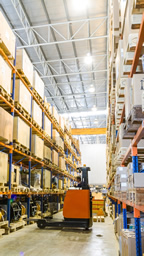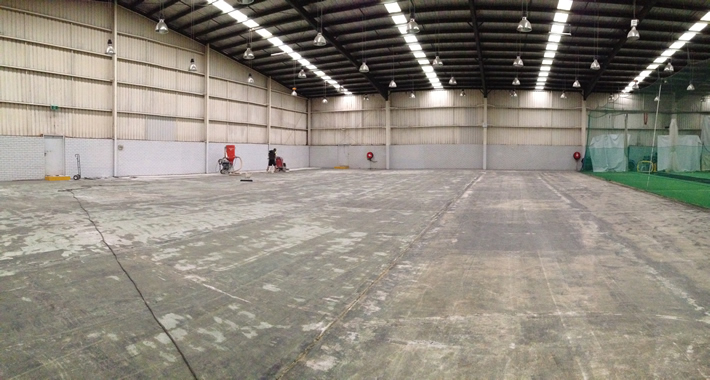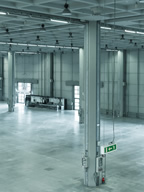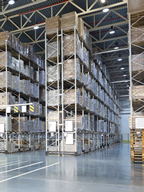Finishes For Factory Floors
When selecting a finish and contractor for a new or existing factory floor or large warehouse space several items must be taken into careful consideration.
Let's take a look at the main issues:
- Durability
 Sustain forklift and other vehicle traffic.
Sustain forklift and other vehicle traffic.- Pallets and heavy objects dragged across the floor.
- Heat protection (welding etc).
- Chemical and liquid stains.
- Dust management
- Cleaning and maintenance
- O, H and S.
- Eliminate trip hazards.
- Slip prevention.
- Joint sealing.
- Cost effective finish for typically very large areas
- Multi purpose areas may require different finishes

Choosing a Finish
Each factory has its own ideal set of requirements based on the usage of the space, the type of concrete in the slab and its condition. These elements should be assessed and then, taking the budget into consideration, a floor finishing and maintenance procedure should be put in place.
Its important to note that some factories require a mix of finishes, for example, the bulk of a factory can be machine finished but a penetrative, non-slip sealer could be used for specific wet areas.
General Finishing Options
Epoxy/Polyurethane painted coatings
 Pros
Pros
- Non-slip options for wet areas.
- High wear areas can be re-coated.
- Gloss or Matt options.
- Can be coloured paint.
- Lower cost.
- Cons
- Requires re-coating.
- Thorough floor preparation required.
CCC Commercial/Industrial Machine Grind
 Pros
Pros
- Low maintenance.
- No re-coating required.
- Better looking.
- Harder wearing.
- No downtime for maintenance.
- Eco friendly
- Cons
- Slightly higher cost.
- Not suited for wet areas.
Pre-preparation
Floor pre-preparation is extremely important for coated floors. To ensure that Epoxy or Polyurethane topical coatings will bond to the surface a floor must be prepared through a process of grinding and cleaning. (similar to prepping any surface that will be painted) A machine ground finish on the other hand requires little preparation.
Using a mix of finishes
Depending on usage various finishes can be applied i.e. a factory may have a machine ground finish applied to fork lift traffic areas while epoxy or polyurethane sealers can be used in wet areas.
Concrete Type and Condition
Great consideration must be taken when choosing a finish type, be it penetrative sealer, polyurethane, machine grinding, to ensure it is compatible with the existing floor i.e. how porous is the concrete, what density it is, has it been previously damaged with age, chemicals, oil or tile glue etc.
Typical Scenarios
Medium sized forklift factory, rental space, low budget
Epoxy and Polyurethane coatings will wear out (especially in high traffic areas) and require re-coating. Re-coats may be required annually in high traffic areas and the entire floor will need a re-seal within six to seven years.
One must assess the impact on re-coating will have on the operation of the factory. If, because of budgetary reasons the factory owner has elected for a painted coating high traffic areas can be coated more times i.e. the wider floor area will be coated twice where a high traffic forklift area might have four or five coatings applied for durability purposes.
Truck manufacturing plant
A large and well known trucking firm previously had their floors finished in Epoxy. This necessitated down time each year where all machinery and equipment had to be moved aside so the floor could be re-sealed. This maintenance brought the factory operation and productivity to a halt. After due consultation a machine ground (polished concrete) finish was applied which removed the necessity of an annual shut down.
Conclusions
Choose a floor finishing system or mix of systems best suited to the existing surface, typical usage of various areas in the factory and budget. An experienced concrete polishing consultant will work collaboratively with the factory owner or manager to ensure the floors are finished correctly and so that there is minimal disruption to productivity in the short and long term.

